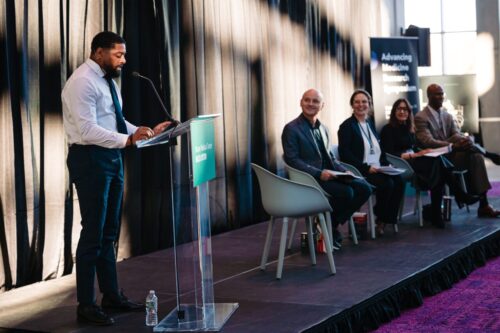Families Take the Driver's Seat in BMC's Holistic Pediatric Care Program
September 1, 2021
By Leslie Doyle

Getty Images
BMC's Center for the Urban Child and Healthy family tailors pediatric primary care to address their families' needs, like financial counseling, to transform their health.
The challenge of addressing social determinants of health has only been compounded for many families during the pandemic. Lost income had furthered food insecurity, with 14% of U.S. families in households with children reporting that they or their children sometimes don’t have enough to eat. The pandemic has also disrupted pediatric care, including routine vaccinations and appointments. A recent survey found 25% of households have a child who has missed a preventive appointment in the past year.
Additionally, young children are experiencing profound stress and uncertainty during a crucial stage of development. The American Academy of Pediatrics found that COVID-19-related quarantine and physical isolation, along with uncertainty about the future, have eroded emotional and behavioral wellbeing, particularly among populations with a higher baseline risk: families of color, families living in poverty, refugees and families seeking asylum, children with special healthcare needs, and children involved with the child welfare and juvenile justice systems.
“Health disparities cause a vicious cycle, and that has gotten worse during the pandemic,” says Lupita Estela, a wellness advocate at Boston Medical Center (BMC). “It’s hard to focus on your child’s development if basic needs like food and housing aren’t being met. It’s so important to help families meet basic needs so they can free up some of that mental and emotional space and really care for their child.”
To that end, the Center for the Urban Child and Healthy Family and BMC’s pediatric primary care team are working with families to understand and support their unique needs throughout COVID-19 and beyond. This initiative is part of the Center’s Pediatric Practice of the Future, first developed in 2019. As of this early this summer, 100 families across the Boston area have participated in the pilot program.
The goal is to create a new model of care that involves families in the creation of the program.
A medical and psychosocial approach to pediatric primary care
The Center for the Urban Child and Healthy Family takes a novel approach to delivering pediatric care. This starts with an enhanced care team that includes the pediatrician and the community wellness advocate, along with a dedicated financial counselor, nurse, social worker, and scheduler, who meet weekly to coordinate families’ medical and psychosocial needs.
At the center of the team, in the driver’s seat, is the family.
Team members meet with families over time to gain a deep understanding of their long-term goals and aspirations for their child’s care. Together they tailor their child’s primary care to address parents’ wishes and desires. This responsiveness aims to transform families’ experiences and expectations of how healthcare works.
Community wellness advocates are the face of the program, regularly talking with families to tackle concerns and partnering with them to achieve goals. They support families and help them to thrive by conducting pre-visit planning ahead of well-child visits, assessing needs and priorities, and connecting families with the team’s financial counselor. The relationship is intended to be longitudinal.
“Even though needs may be amplified during the pandemic, it’s rewarding to see that we can help families build a toolbox of skills to resolve issues as they come up,” Estela explains. “It starts to feel more manageable for them.”
This was the case for a family Estela is working with through the program. Facing mounting debt, the family’s primary caregiver had a great deal of anxiety around childcare and housing. At one point, she worried that their utilities would be shut off. Estela built a relationship with the family and helped address issues before they could become crises. Over time, the conversations changed.
“We’ve gotten to know each other well, and now when we talk, she’s more relaxed,” says Estela. “She knows if anything comes up she can reach out to us.”
Making financial counseling a key element of pediatrics
Many of the supports the Center offers are outside of what would be considered traditional primary care, yet they are inextricably linked to children’s health and wellbeing. Financial counseling, for example, is core to the program.
“First and foremost, what we learned was that families want support around their economic wellbeing,” says Carey Howard, program director of BMC’s Center for the Urban Child and Healthy Family. “Particularly during the pandemic, we’ve really seen these areas of need for families come to a head.”
Throughout the pandemic, many families have experienced losses in employment, childcare, and other family resources. The fact that the financial counselor is already an established member of the family’s care team makes the process of supporting families dealing with losses much smoother.
“Whether they’re facing a housing crisis or lack of childcare, that has been compounded by COVID-19,” says Howard. “These problems are quite pervasive, and they trickle down to children.”
Through approaches like family asset mapping and goal setting, the community wellness advocate is well-positioned to identify and support families’ needs for care responsively and holistically. During pediatric clinic visits, for instance, advocates prioritize connecting parents to their own primary care and to financial planners.
This holistic approach to pediatric primary care seeks to support physical health as well as emotional and spiritual wellbeing. It’s particularly crucial amid the COVID-19 pandemic, when mental health supports are stretched to capacity. Behavioral health support is embedded into the program’s pediatric care model, but all practitioners see the family’s emotional wellbeing as a goal.
“When we asked families what health means to them, they first said absence of illness and, secondarily, many said spiritual wellbeing,” says Howard. “That was profound for us—a moment to recognize that families are thinking beyond medicine. We realized that spiritual support was an aspect of the hospital that we might not have been using to its full potential as a way to help families during difficult times.”


